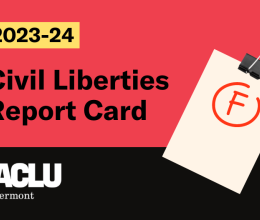Two years after the arrest of an African-American man in his own home, the ACLU-VT has won Anne Galloway of the investigative online news site VtDigger.org the right to access information for a story on possible racial profiling by the Hartford Police Department.
The Vermont Supreme Court ruled Friday that Hartford must turn over police department records about an incident over the Memorial Day weekend in 2010 when Wayne Burwell was pepper-sprayed, beaten, hand-cuffed, and dragged naked from his own home by Hartford police. The decision reverses a superior court ruling in November 2010 that restricted access to most of the records.
Galloway had written before on racial profiling in Vermont. She requested the records because she wanted to know if police may have treated Burwell differently because of his race.
Police refused to give her the records, claiming that the records were exempt from Vermont’s public records act. The ACLU of Vermont agreed to represent Galloway in a lawsuit to press what she felt was her right to access the information.
Friday’s decision is a major win in the ongoing fight for open government in Vermont. More work needs to be done to improve police records access, but this decision is a big step in the right direction. The ACLU-VT encourages news reporters and members of the general public to use this decision to improve accountability around police actions.
Dan Barrett, ACLU-VT staff attorney who represented Galloway, noted, “This is a very important interpretation of the public records act. We are pleased that the court agreed that Vermonters have the right to know when and how the police are pulling people from their homes.”
The “police records exemption” of Vermont’s public records law (1 VSA §317, Section (c)(5)7), states that “records dealing with the detection and investigation of crime, including those maintained on any individual or compiled in the course of a criminal or disciplinary investigation by any police or professional licensing agency” are exempt from disclosure, “provided, however, records relating to management and direction of a law enforcement agency and records reflecting the initial arrest of a person and the charge shall be public.”
The town of Hartford argued before the Supreme Court that Burwell had not been arrested, and therefore the town didn’t have to disclose the police records of the incident.
On Friday, the Supreme Court rejected that argument, concluding that Burwell was, despite the town’s claims, in fact under arrest after being pepper-sprayed, hit repeatedly with a nightstick, handcuffed, and removed from his home. It noted that even the report completed by Hartford police about the incident said force was used against Burwell because he was “resisting arrest.”
Friday’s decision again stirs the muddy waters of access to information about police actions. In the first of three public records cases this spring (Bain v. Clark), the court seemed to be moving towards a general rule that the public was entitled to greater access than police, prosecutors, and the Attorney General’s Office were currently providing. But in the second case (Rutland Herald vs. Vt. State Police and Office of the Attorney General), it ruled that the police records exemption demands that all police records dealing with the detection and investigation of crime remain off-limits – forever. The court’s third decision in the case Rutland Herald v. City of Rutland and AFSCME Council 93, Local 1201) noted that only records dealing with criminal activity could be treated that way. Other records of non-criminal matters had to be disclosed unless privacy interests were at stake.
The decision issued Friday in the Hartford case notes that the police records exemption specifically states information connected to an arrest must be disclosed.
The ACLU and other open government advocates have argued that Vermont should adopt the “access absent harm” standard that the federal government and many states use when deciding police records cases. That standard says records are disclosed unless police or others can show harm -- to a suspect’s rights, to a witness’s safety, or to a victim’s welfare, for example. This allows the public greater access to police records while acknowledging legitimate privacy interests.
The Supreme Court declined, in Friday’s decision, to implement (as courts in other states have done) the “access absent harm” standard. It noted that “many other states are guided by statutory criteria that provide police and courts with a far better and more defined framework in making decisions about disclosure of this type of record. The majority of our New England neighbors have adopted an open records rule of reason permitting public access to investigative records absent identifiable harm in disclosure.” The justices decided, though, to “leave that issue to the Legislature.”
A week ago, Burwell filed a civil rights lawsuit in U.S. District Court in Burlington against the town, alleging excessive force, illegal detention, negligent training, and racial profiling by Hartford officers.
His attorney, Ed Van Dorn, told the Valley News last week that it was hard not to conclude that racial profiling was at play in the Burwell case. “When police entered that bathroom [where Burwell was sitting on the toilet, dazed, because of a medical condition], if they saw a white guy sitting there comatose, they would have assumed a medical emergency. But because they saw a black guy sitting there, they assumed burglar and criminal activity.”
Filed as part of Burwell’s lawsuit was a police audio recording of the arrest. The language is coarse and aggressive: “Show your f—ing hands up or I’ll shoot you mother—er,” police are heard to yell at Burwell. “Put your hands up now. Show me your f—ing hands.”
Galloway will now have a chance to listen to that recording and to see other records related to the case.
The decision was 4-1, with Justice Burgess dissenting. Justice Dooley and Judge Zonay (Zonay is a superior court judge who sat with the supreme court for this case) offered a concurring opinion that argued there should be a general presumption that police records that don’t deal with crime – as in the Burwell incident -- are categorically open to the public.
Read the Supreme Court’s decision in Galloway v. Town of Hartford.



